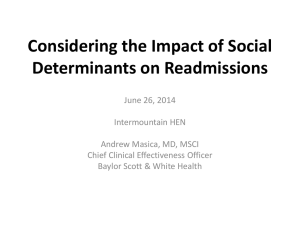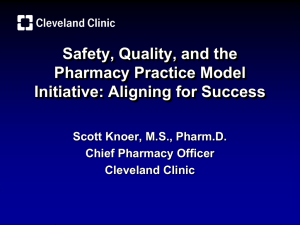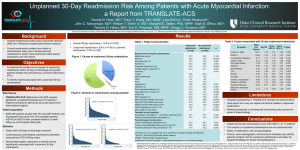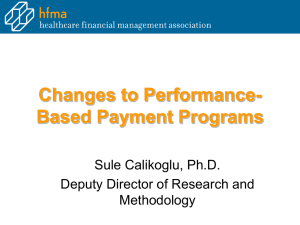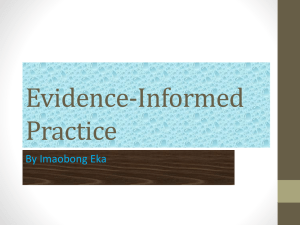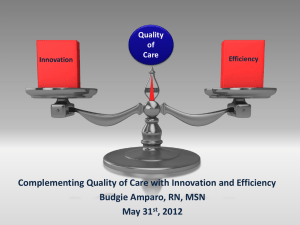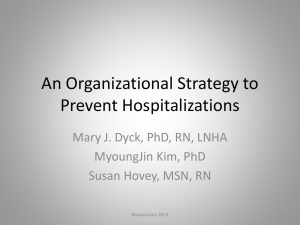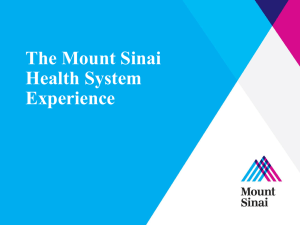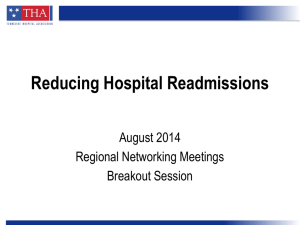Readmission Race Best Practice Showcase
advertisement
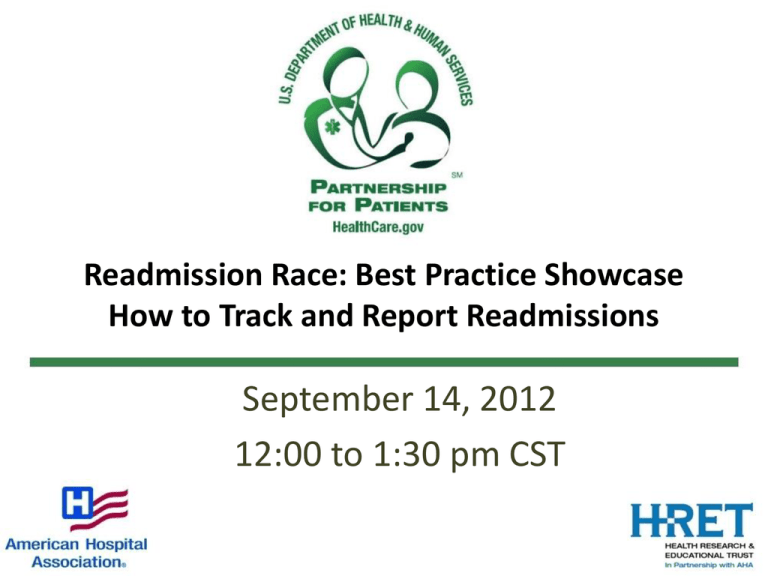
Readmission Race: Best Practice Showcase How to Track and Report Readmissions September 14, 2012 12:00 to 1:30 pm CST Welcome and Overview • Welcome, thank you for joining us today! • Housekeeping – This webinar is being recorded and will be archived. – You will receive a PDF of today’s presentation, as well as a link to fill-out the evaluation and a summary of Q&A. – For questions: please reach out to your state lead or email us: HEN@aha.org. • Agenda – Hospital Sharing and Coaching – Readmissions Race Update – Q&A 2 Introductions • Tasha Gill, MPH, HRET • Denise Remus, PhD, RN, Cynosure Health • Sherry Jensen, MSN, RN-BC, CPHQ Saline Memorial Hospital • Kathy Beck, RN, MSN, CPHQ, Grenada Lake Medical Center • Amy Paul, RN, BSN, CCM, Memorial Hospital of Rhode Island • Charisse Coulombe, MS, MBA, CPHQ, HRET 3 Readmission Race: Best Practice Showcase How to Track and Report Readmissions Sherry L. Jensen, MSN, RN-BC, CPHQ Quality/Risk Department Manager Saline Memorial Hospital Saline Memorial Hospital Saline Memorial Hospital is a full-service 167-bed facility that has served Saline County and surrounding areas for over 55 years. The hospital is located just off of I-30 in Benton, about 20 miles south of Little Rock. In addition to the hospital, Saline Memorial manages an Internal Medicine Clinic, General Surgery Clinic and Women’s Clinic. 5 Defining Readmissions • Readmissions to SMH only • Looking at Medicare readmissions, along with allpayer source readmissions • Exclude deaths, those discharged AMA, and those discharged to psychiatric facility, acute care rehab, and hospice 6 Securing Data • Information Systems (IS) wrote readmission query program • Each admission searched using MR# for previous IP admissions w/in 30 days • Readmission report automatically sent each morning to designated departments 7 Utilizing Readmission Data • Each readmission is researched for payer source, diagnosis, discharge/readmission destination, and case management plan of care for initial admission • Data is reported in all physician, staff, administrative, and Board of Director meetings • Quality/Risk, Case Management, and Nursing use data to change/revise current processes 8 Top 3 Data Challenges and Solutions Challenges Solutions 1. Obtaining baseline data 1. Worked closely w/IS to define data criteria 2. Overwhelming feelings r/t data 2. Developed plan of action w/key leaders 3. Lack of knowledge r/t readmission criteria/consequences 3. Education to nursing staff, physicians, and administration. 9 If I Could, I Would . . . While readmissions had been tracked and discussed for many years, I wish we had taken this more focused approach earlier. Becoming aware of each readmission is changing our point of view, changing our processes, and hopefully, changing our patient outcomes. 10 Readmission Race: Best Practice Showcase How to Track and Report Readmissions Kathy L. Beck, RN, MSN, CPHQ Chief Nursing Officer Grenada Lake Medical Center Hospital Story – Who We Are… • • • • • Grenada Lake Medical Center, Grenada MS Kathy Beck, RN, MSN, CPHQ, Chief Nursing Officer County-owned, rural community hospital Located halfway between Memphis, TN and Jackson, MS Licensed for 156 beds 12 Defining Readmissions • Measuring 4 outcome indicators • All patients readmitted 15 days after discharge. • All patients readmitted 30 days after discharge. • Medicare patients readmitted 15 days after discharge. • Medicare patients readmitted 30 days after discharge. • Measuring 2 process indicators • Discharge instructions were performed and included requirements. • Follow up appointment given to patient. 13 Defining Readmissions • All DRGs included, but more intensive review of heart failure, AMI, and pneumonia education. • Readmitted to our hospital only 14 Securing Data • Monthly Data collection • Abstracted by coders directly into coding module of AS400 (Seimens MedSeries 4). • Electronic, queried download from AS400 to Microsoft Access. • Download automated through NGS IQ Client, querying software from New Generation Software, Inc. and Windows Task Scheduler. • Includes various fields, including admitting/attending physician, DRG, admission source, discharge code, POA information, etc. 15 Securing Data • Monthly Data collection (continued) • Data analysis and reports through Microsoft Access • Graphs in Excel • Developing automation and original reports were time consuming, but ongoing monthly less than 2 hours including entering into HEN database. • Do not track across the continuum. • Do not track specific nursing home routinely 16 Securing Data • Daily Reports • Automated patient list to email. • List developed in NGS IQ Client and automated through Windows Task Scheduler • Query uses medical record number and unique reference number and compares to previous admission dates (from ADT), if less than 30 days includes the patient. • A few false positives on the list because of inhouse transfers to Subacute or Geri-Psych. 17 Utilizing Readmission Data • Readmissions are analyzed by DRG, admission source, discharge source, etc. • Physician and staff report cards are sent monthly, with quarterly readmission rates by physician • Physician data is sent to Peer Review and reappointment chairman • Weekly update of identified issues to nursing leadership with monthly rate updates • Quarterly updates to the Board of Trustees 18 Top 3 Data Challenges and Solutions Challenges Solutions 1. Availability of Query Builders 1. Prioritize the need and automate as much as possible 2. Concurrent Patient Identification 2. Daily List 3. Limitations of data related to continuum or other facilities 3. Exploring data exchanges with physician offices 19 If I Could, I Would . . . • Create more and better triggers. • Data interface across the continuum • Add Case Manager hours to do more post-discharge follow up calls. • More community resources 20 Readmission Race: Best Practice Showcase How to Track and Report Readmissions Amy Paul, RN, BSN, CCM Director, Continuing Care Memorial Hospital of Rhode Island Hospital Story – Who We Are… • This story is presented by Amy Paul, RN, BSN, CCM – Director of Continuing Care at Memorial Hospital of Rhode Island. • Memorial Hospital of Rhode Island (MHRI) is licensed for 294 beds. An affiliate of Brown University’s Warren Alpert Medical School, we are the chief site for the Medical School’s primary care academic program. We serve the Blackstone Valley of Rhode Island, and southeastern Massachusetts. Our vision: to excel as a primary healthcare network and community teaching hospital. 22 Defining Readmissions • Unique patients are identified via medical record number • Exclusions: Transfers to MHRI’s Center for Acute Rehabilitation; scheduled chemotherapy admissions; elective surgeries; obstetrical admissions for term deliveries; newborns; observation episodes of care • Dashboard highlights fee for service Medicare readmissions at intervals of <72 hours, 4-7 days, 8-30 days • Dashboard highlights surgical readmissions to surgical vs. non surgical settings • Sorting capability available by payer type, service, unit, diagnosis, discharge disposition, length of service 23 Securing Data • Data source: A/D/T system • Data are extracted from reportable fields and exported to Excel worksheets • Initial resource requirement: less than 40 man hours to develop reporting logic • Ongoing resource requirement: data analyst administers, tests / validates report, and distributes data; less than 20 man hours / month required to produce a monthly report 24 Securing Data • Environmental limitation: ADT system has finite reportable fields; some manual research required to track specific discharge settings • Patients are identified for detailed research based upon number / frequency / intervals between admissions • Tools for systems analysis: patient interviews using IHI STAAR tool; manual review of medical records 25 Utilizing Readmission Data • Oversight, guidance, and operational support provided by MHRI’s Transitions of Care Team: • Chaired by Director of Continuing Care • Championed by VP of Professional Practice • Multi disciplinary body comprised of nurses, physicians, community post acute care providers, pharmacists, homecare professionals, and acute rehabilitation professionals • Meetings are monthly and include presentation of data and updates on both internal projects and state / national initiatives 26 Utilizing Readmission Data • Readmission rate is a measure reported on MHRI’s Performance Improvement Plan • Performance Improvement Committee (PIC) reviews data and action plans quarterly • Continuous quality improvement is pursued at the department level • Cross functional work teams are convened as needed to address priority measures 27 Top 3 Data Challenges and Solutions Challenges 1. EMR is in pre go-live stage Solutions 1. EMR implementation is on schedule 2. Resources are finite 2. Avoid duplication of efforts and prioritize effectively – project champion is a must 3. MHRI serves one of the most resource poor populations in the state 3. Always look to our vision and mission 28 If I Could, I Would . . . Build desktop reporting capability on a foundation of integrated platforms for ADT reporting, outcomes management, utilization management, discharge planning, and financial reporting 29 Resources • Boulding, W., Glickman, W., Manary, M., Schulman, K., and Staelin, R. (2011) Relationship Between Patient Satisfaction With Inpatient Care and Hospital Readmission Within 30 Days. The American Journal of Managed Care. 17 (1) p. 41-48 • Hansen, L.O., Williams, M.V., and Singer, S.J. (2011) Perceptions of Hospital Safety Climate and Incidence of Readmission. Health Services Research. 46 (2) p. 596-616 30 Readmission Race: Best Practice Showcase Readmissions Race Update Charisse Coulombe, MS, MBA, CPHQ Senior Director, Grants and Projects Health Research & Educational Trust Readmission Race Data Submission • How? – LAP 1: Submit baseline data (the total number of readmissions for January – June 2012 or for 2011). If you have already entered this data, we are using the numerator information that you submitted as your baseline. – LAP 2: On a monthly basis, submit the total number of readmissions that you have each month starting in July • July’s data can be submitted during the month of September when . 32 How will we submit our readmission data? • HRET is looking at reducing the total number of readmissions (measure selected by the hospital) during the 6 month race. • Option 1: Continue to submit your outcome 30 day readmission measure into the Comprehensive Data System. The Encyclopedia of Measures has the complete list. For example, if your hospital has been submitting 30 day all cause readmission rates, please continue to submit that measure (numerator and denominator) monthly through December, 2012. • Option 2: If your hospital does not have an outcome readmission measure selected, there are 2 additional options. They are listed in the Encyclopedia of Measures and within the Comprehensive Data System. They are labeled “Readmissions RACE – 15 day readmissions” and “Readmission RACE – 30 day readmissions”. 33 How do I get my data entered? Log into the CDS. Select Preventable Readmission. Select your current outcome readmission measure or select one of the “Readmission RACE” measures. Enter your baseline data timeframe. Enter your baseline data. Please note that if the “Readmission Race” measure is selected, only the numerator is needed (enter the number in the numerator and denominator field). Click Submit. Enter your monitoring data. Please note that if the “Readmission Race” measure is selected, only the numerator is needed (enter the number in the numerator and denominator field). July monitoring data can be entered in September. 34 Readmissions by the Numbers • 267 hospitals submitting 30-day readmissions rate measure (EOM) • 8 hospitals submitting 30-day Readmissions Race measure (numerator only) • Some hospitals are tracking HF, PN, AMI and 15 day readmissions – we still need that data! 35 Readmission HEN Baseline • 275 – Number of Hospitals reporting baseline data • 98,118 – 30 day readmissions occurring in 2011 and/or 1st 6 months of 2012 (Baseline timeframe) • 42 – Average number of 30 day readmissions per month for baseline (275 hospitals submitting) 36 Readmission HEN Monitoring • 104 – Number of Hospitals reporting July’s 30 day readmissions measure • 1,777 – Number of 30 day readmissions occurring in July 2012 • 17 – Average number of 30 day readmissions (104 hospitals submitting) 37 Questions ? 38 Coming Up…. • Upcoming Readmissions Race Events Speaker Date and Time Topic Dr. Mark Williams Monday, September 24, 2012 12:00 – 12:45 PM, Central Conducting Risk Assessments During the Patient Stay Dr. Eric Coleman Wednesday, October 10, 2012 12:00 – 1:30 PM, Central Best Practice Showcasing Call Dr. Amy Boutwell Monday, October 22, 2012 12:00 – 12:45 PM, Central Improving the Discharge Planning Process • Thank you for joining us! 39


